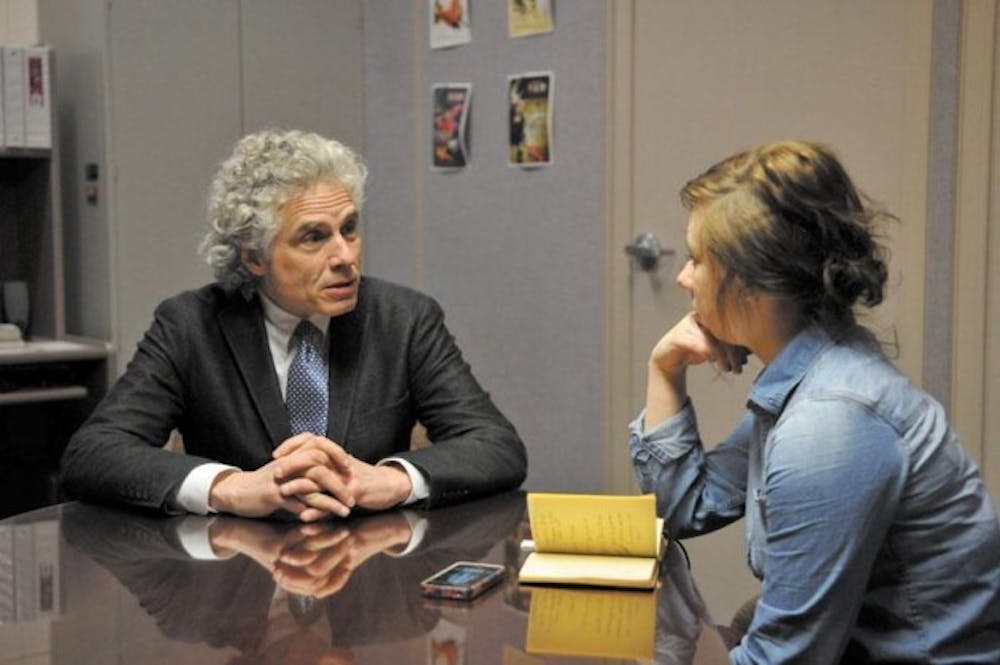Humans are inherently good and inherently violent, and how we act just depends on if the better angel has the upper hand, according to Steven Pinker.
Humans have a "better angel" and a "worse angel" within them, and each has a tendency to control human actions - namely the choice to commit acts of peace or acts of violence, he said.
And, right now, the better angels are prevailing. This 21st-century society is living in the most peaceful period of man's existence, according to Pinker.
"We're living in, by historical standards, in an unusually peaceful time," he explained in an interview with The Spectrum Wednesday night. "Rates of death and war are lower than they ever were. Rates of death and homicide, state-sponsored violence - like capital punishment - all of those are down compared to past decades and centuries and the question is: Why?"
Pinker - an experimental psychologist and cognitive scientist who primarily explores territories of language, the mind and human nature - has attempted to answer that question through data analysis in his newest book, The Better Angels of Our Nature: Why Violence Has Declined.
Pinker, a professor of psychology at Harvard University, discussed the numbers behind his belief that we, as a society, are living in the most peaceful era in human history during his lecture as UB's fifth Distinguished Speaker of the 2012-13 season. His lecture, accompanied by a myriad of PowerPoint slides with expansive graphs and charts, explored what Pinker called "six major historical declines of violence."
"I had come across a number of data sets that suggested that the world had gotten more peaceful and most people think it's the other way around," he said. "That itself is a problem and an interesting topic in psychology: Why are people's assessments of risk out of whack with reality?
"But I had known rates of violence had gone down since the Middle Ages; I had known that rates of violence in tribal non-state hunting and gathering societies was much higher than in modern states."
Pinker, who had studied language and the way the mind works before branching into studies of violence, had compiled a blog post full of observations on how rates of violence had seemed to go down over time. He had done so in response to a question asked to 100 scientists: What are you optimistic about?
Once more scientists began to confirm his assertions with more data, Pinker knew he had to write a book.
One of the major reasons society has moved toward a span of peace: The creation of central governments and states, which, according to Pinker, took humans out of a state of anarchy.
"There's always the capability of violence and the reason it's gone down is that our ancestors have tried to figure out ways to reduce it," he said. "It's kind of like maintaining a house - your roof doesn't leak, but you still have to replace the roof every few years. If a leak does develop, you have to fix it right away. You can't let the foundation rot."
But the decrease in violence hasn't led a decrease - or even increase - in public fear; Pinker claims that emotion can't be measured, per se.
"I'm not sure that we're more afraid than we used to be," he said. "Terrorist attacks actually are responsible for a tiny fraction of violent deaths ... But terrorist acts are almost guaranteed to attract attention; in fact, the whole point of terrorism is to attract the attention of the media. And I think that the media should present more violent news items in the context of overall statistics - how many have there been that year on a per capita basis compared to other years."
The spread of technology - namely cameras, television and the Internet - has brought scenes of violence directly to the public. The Vietnam War is widely said to be the first war brought into people's living rooms, according to Pinker. As a result, America saw its first strong anti-war movement because people were seeing death and carnage instead of just reading about it, he said.
Even though violence is at an all-time low, Pinker said because the populace is much more literate and educated than in earlier times, he doesn't see the slope spiking back up.
"We don't burn heretics at the stake because we are sophisticated enough to know heretics are not going to lure people into damnation in hell; people probably don't take the concept of hell that literally," he explained. "We don't sacrifice people to placate angry gods because we know that isn't going to bring better weather. That's not going to cure disease. That's not going to make the crops bear fruit. If we want crops to bear fruit, we use fertilizer. If we want to cure disease, we use antibiotics."
Pinker noted that violence in modern society has led to government and individual efforts to reduce future incidents. After 9/11, the government strengthened the Department of Homeland Security and tightened airport restrictions. The Brady Bill was signed into law after James Brady was shot during an attempted Ronald Regan assassination. Recently, gun control measures have been pursued in the wake of the Sandy Hook Elementary shooting.
"Our efforts at improving the human condition have succeeded," Pinker said. "We haven't reached a utopia, but things are better than they used to be. We should just keep whittling down the numbers; we should try to reduce it to half of what it is now and then reduce it to half again and just keep nibbling away at it. That's our best hope."
Pinker believes there is no answer to the question, "Are people basically good or violent?" and we have impulses in both directions - the outcome of the impulse just depends on historical circumstances.
Comedian Steve Martin will visit Alumni Arena as the sixth and final Distinguished Speaker on April 27.
Email: news@ubspectrum.com





